Filter by

Stochastic discounted cash flow : a theory of the valuation of firms
This open access book discusses firm valuation, which is of interest to economists, particularly those working in finance. Firm valuation comes down to the calculation of the discounted cash flow, often only referred to by its abbreviation, DCF. There are, however, different coexistent versions, which seem to compete against each other, such as entity approaches and equity approaches. Acronyms …
- Edition
- -
- ISBN/ISSN
- 9783030370817
- Collation
- xxii, 241p. : ill.
- Series Title
- -
- Call Number
- 339 KRU s

Liberal democracy : prosperity through freedom
This open access book aims to show which factors have been decisive in the rise of successful countries. Never before have so many people been so well off. However, prosperity is not a law of nature; it has to be worked for. A liberal economy stands at the forefront of this success – not as a political system, but as a set of economic rules promoting competition, which in turn leads to innova…
- Edition
- -
- ISBN/ISSN
- 9783030474089
- Collation
- viii, 74p. : ill.
- Series Title
- -
- Call Number
- 330.01 MEY l
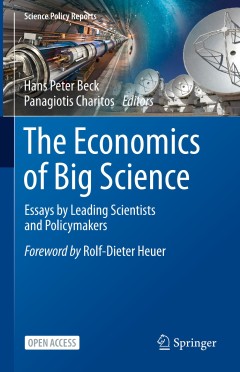
The economics of big science : essays by leading scientists and policymakers
The essays in this open access volume identify the key ingredients for success in capitalizing on public investments in scientific projects and the development of large-scale research infrastructures. Investment in science – whether in education and training or through public funding for developing new research tools and technologies – is a crucial priority. Authors from big research lab…
- Edition
- -
- ISBN/ISSN
- 9783030523916
- Collation
- viii, 137p. : ill.
- Series Title
- -
- Call Number
- 330 ECO e

Determinants of financial development
As the world has witnessed the worst financial crisis and climate crisis of our age, during the period of 2007-2009, the issues surrounding the emergence and development of financial markets and carbon markets is becoming an increasingly significant area of research and debate worldwide. By engaging with recently developed methods of research and new areas of practice, this book investigates th…
- Edition
- -
- ISBN/ISSN
- 9780230302495
- Collation
- xix, 206p. : ill.
- Series Title
- -
- Call Number
- 332.042 HUA d
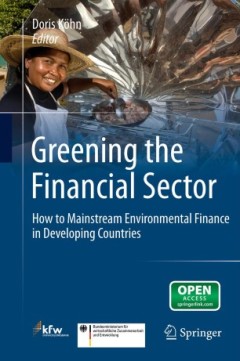
Greening the financial sector : how to mainstream environmental finance in de…
Given the manifold challenges of financial sectors in developing and transition countries, one might be tempted to believe that embarking on “green” finance is not a priority for financial systems development. However, there are a number of arguments against this view. Environmental finance, particularly energy efficiency and renewable energy (EERE) finance, can and should serve as an inter…
- Edition
- -
- ISBN/ISSN
- 9783642050879
- Collation
- xiv, 249p. : ill.
- Series Title
- -
- Call Number
- 332.1 GRE g
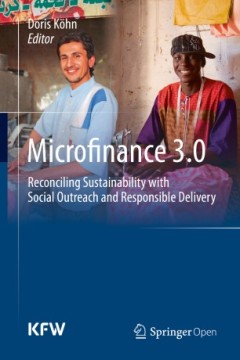
Microfinance 3.0 : reconciling sustainability with social outreach and respon…
This book focuses on the achievements, current trends and further potential of microfinance to scale-up and serve many more clients with financial services that enable them to improve their living conditions. The book asks what it takes to achieve sustainable impact: to know your clients and to understand their needs, to treat them in a fair and transparent way, and to safeguard the synthesis b…
- Edition
- -
- ISBN/ISSN
- 9783642417047
- Collation
- xi, 199p. : ill.
- Series Title
- -
- Call Number
- 330 MIC m

Synchronized factories : Latin America and the Caribbean in the era of global…
The objective of this report is to examine the extent to which countries in Latin America and the Caribbean participate in global value chains and what are the drivers of such participation. Production processes have been increasingly fragmented worldwide. For example, the production of the Boeing 787 Dreamliner involves 43 suppliers located in 135 locations around the globe. There are many ex…
- Edition
- -
- ISBN/ISSN
- 9783319099910
- Collation
- xiv, 141p. : ill.
- Series Title
- -
- Call Number
- 658.5 SYN s
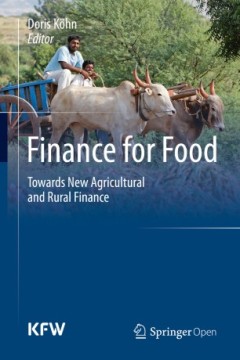
Finance for food : towards new agricultural and rural finance
This book reflects the current state of discussion about agricultural and rural finance in developing and transition countries. It provides insight into specific themes, such as commodity value chains, farm banking, risk management in agricultural banking, structured finance, crop insurance, mobile banking, and how to increase effectiveness in rural finance. Case studies illustrate various aspe…
- Edition
- -
- ISBN/ISSN
- 9783642540349
- Collation
- xii, 295p. : ill
- Series Title
- -
- Call Number
- 630.681 FIN f
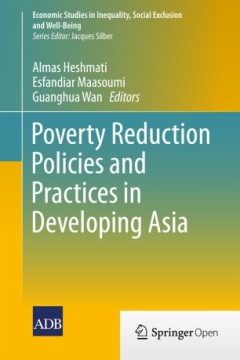
Poverty reduction policies and practices in developing Asia
This book looks at the major policy challenges facing developing Asia and how the region sustains rapid economic growth to reduce multidimensional poverty through socially inclusive and environmentally sustainable measures. Asia is facing many challenges arising from population growth, rapid urbanization, provision of services, climate change and the need to redress declining growth after the g…
- Edition
- -
- ISBN/ISSN
- 9789812874207
- Collation
- xi, 314p. : ill.
- Series Title
- -
- Call Number
- 338.95 POV p
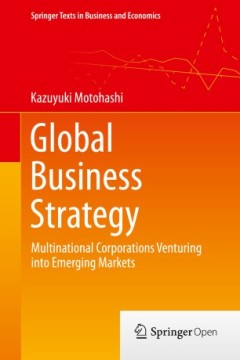
Global business strategy : multinational corporations venturing into emerging…
This book presents theories and case studies for corporations in developed nations, including Japan, for designing strategies to maximize opportunities and minimize threats in business expansion into developing nations. The case studies featured here focus on Asia, including China and India, and use examples of Japanese manufacturers. Five case studies are provided, including Hitachi Construct…
- Edition
- -
- ISBN/ISSN
- 9784431554684
- Collation
- xvii, 259p. : ill.
- Series Title
- -
- Call Number
- 658.18 MOT g
 Computer Science, Information & General Works
Computer Science, Information & General Works  Philosophy & Psychology
Philosophy & Psychology  Religion
Religion  Social Sciences
Social Sciences  Language
Language  Pure Science
Pure Science  Applied Sciences
Applied Sciences  Art & Recreation
Art & Recreation  Literature
Literature  History & Geography
History & Geography